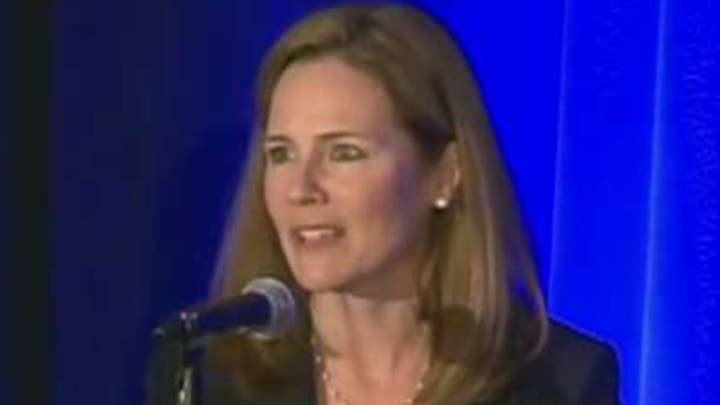Impact of vacant court seat on contested election
Ilya Shapiro, director of the Robert A. Levy Center for Constitutional Studies at the Cato Institute, on the debate over a potential 'constitutional crisis' if the Supreme Court is deadlocked during a possible contested election.
Amy Coney Barrett received a shocking introduction to Washington politics when she faced off with Democratic senators in 2017 at her confirmation hearing to sit on the 7th circuit U-S Court of Appeals. At issue was her religious beliefs.
Senator Dianne Feinstein, D-Calif., told her bluntly, "The dogma lives loudly within you, and that's of concern."
Barrett's response was measured but on point: "If you're asking whether I take my Catholic faith seriously, I do, though I would stress that my personal church affiliation or my religious belief would not bear on the discharge of my duties as a judge."
President Trump announced Saturday that he has chosen Barrett as his pick for the Supreme Court.
WHO IS JUDGE AMY CONEY BARRETT, POTENTIAL SCOTUS CONTENDER?
It is the 48-year-old's perceived views on the intersection of faith and the law that has drawn praise from conservatives -- and concern among progressives.
She told a 2006 Notre Dame law school graduating class, "Your legal career is but a means to an end, and... that end is building the kingdom of God... if you can keep in mind that your fundamental purpose in life is not to be a lawyer, but to know, love, and serve God, you truly will be a different kind of lawyer."
The rhetoric matches that of her mentor Justice Antonin Scalia, for whom she clerked two decades ago. She recalled he was a tough but fair boss.
"In these conferences where you debated the merits of cases, you had to be on your feet, know your stuff inside and out, you had to be articulate."
Like the late justice, Barrett has a large family -- she is the mother of seven children. Two are adopted from Haiti.
The Indiana-based judge has talked about the challenges of juggling a busy home life and an academic career as a law school professor. But it was her successful political "audition" to serve as a federal judge that, sources say, impressed the White House. Much of the focus of the September 2017 hearing was on abortion rights.
Senator Richard Blumenthal, D-Conn., asked her, "and you have no personal beliefs as to whether Roe was correctly decided?
The nominee's response: "I'm sure every nominee before you would have personal beliefs about that precedent and many others. But all nominees are united in their belief that what they think about a precedent should not bear on how they will decide cases."
HOW THE SUPREME COURT OPERATES WITH ONLY 8 JUSTICES
Barrett was more pragmatic a year earlier-- just days before the 2016 presidential election-- about the chances Roe v Wade would be overturned in coming years.
"I don't think the core case -- Roe's holding that women have a right to abortion -- I don't think that will change," she said. "But I think the question of whether people can get late-term abortions, how many restrictions can be put on clinics, I do think that will change."
Sources say Barrett was personally interviewed by Trump in 2018 for the vacant high court seat that went to Brett Kavanaugh, and the president came away impressed.
Now with nearly three years of experience on the bench, a fuller picture of Judge Barrett's jurisprudence has emerged. She has written more than 100 opinions, including a number of sharply worded dissents that display her conservative bent.
Like her mentor Scalia, Barrett is a proponent of "originalism" or "textualism," a rigorous method of judicial review. As Scalia said in 2005, "Our manner of interpreting the Constitution is to begin with the text, and to give that text the meaning that it bore when it was adopted by the people."
In a 2019 case -- Kanter v. Barr, Barrett dissented from the majority that concluded someone convicted of a non-violent felony can be barred from owning a gun. The judge cited longstanding laws on gun possession:
"Founding-era legislatures did not strip felons of the right to bear arms simply because of their status as felons," she wrote. "Nor have the parties introduced any evidence that founding-era legislatures imposed virtue-based restrictions on the right; such restrictions applied to civic rights like voting and jury service, not to individual rights like the right to possess a gun."
Barrett in her time as a judge has not directly taken on the issue of abortion, but did dissent with some of her conservative colleagues in 2018, over the full court's refusal to rehear a ruling on an Indiana abortion law. Lower courts had dismissed that state law requiring the burial of fetal remains after an abortion. Barrett's dissent made clear she found the law to be constitutional.
ELECTION-YEAR SUPREME COURT BLOCKBUSTERS: A LOOK BACK AT HISTORY
Critics have cited Barrett's prior membership of the University of Notre Dame's "Faculty for Life" group. She was a law professor there before being named to the federal court.
Born in New Orleans, she worked for Scalia in the 1998-99 term.
In her 2017 Senate questionnaire, Barrett offered surprising praise for Justice Elena Kagan, a left-leaning member of the court appointed by President Obama. Barrett said she admired "the knowledge and skill she acquired as an academic to the practical resolution of disputes." Kagan had been dean of Harvard Law School.






















